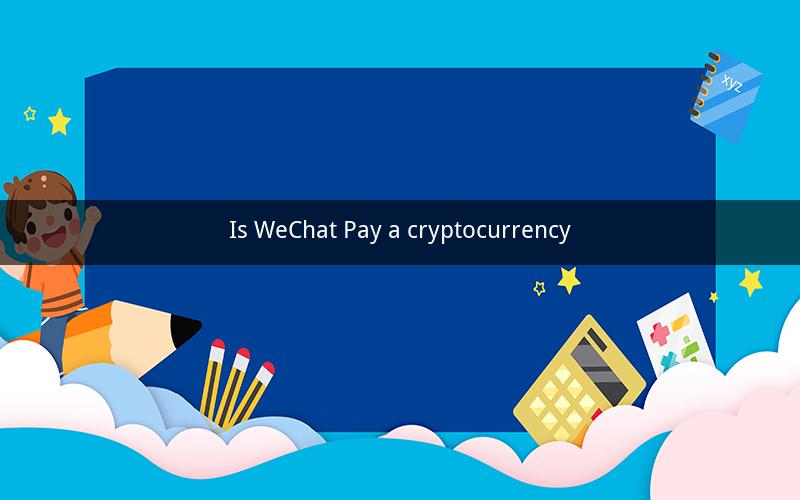
Table of Contents
1. Introduction to WeChat Pay
2. Understanding Cryptocurrency
3. Is WeChat Pay a Cryptocurrency?
4. Differences Between WeChat Pay and Cryptocurrency
5. The Functionality of WeChat Pay
6. The Security of WeChat Pay
7. The Regulation of WeChat Pay
8. The Advantages and Disadvantages of WeChat Pay
9. The Future of WeChat Pay
10. Conclusion
1. Introduction to WeChat Pay
WeChat Pay is a mobile payment and digital wallet service operated by Tencent, a Chinese multinational technology company. Launched in 2011, it has rapidly grown to become one of the most popular payment methods in China. Users can make payments for goods and services, transfer money to friends and family, and even invest in financial products through WeChat Pay.
2. Understanding Cryptocurrency
Cryptocurrency is a digital or virtual currency that uses cryptography for security. Unlike traditional fiat currencies, cryptocurrencies are decentralized and operate independently of any central authority. The most well-known cryptocurrency is Bitcoin, which was created in 2009.
3. Is WeChat Pay a Cryptocurrency?
No, WeChat Pay is not a cryptocurrency. While it shares some similarities with cryptocurrencies, such as being digital and enabling peer-to-peer transactions, WeChat Pay is not decentralized and operates under the control of Tencent. Cryptocurrencies, on the other hand, are decentralized and operate independently of any central authority.
4. Differences Between WeChat Pay and Cryptocurrency
Here are some key differences between WeChat Pay and cryptocurrency:
a. Decentralization: WeChat Pay is centralized, meaning Tencent has control over the platform. Cryptocurrencies are decentralized, with no single entity having control.
b. Security: WeChat Pay uses advanced encryption and security measures to protect users' data and transactions. Cryptocurrencies use blockchain technology for security, which is considered to be one of the most secure ways to store and transfer digital assets.
c. Legal Status: WeChat Pay operates within the framework of existing financial regulations, while cryptocurrencies often operate outside of traditional financial systems.
d. Transactions: WeChat Pay transactions are usually instant and can be completed within a few seconds. Cryptocurrency transactions can take longer, depending on the network's congestion and the chosen blockchain platform.
5. The Functionality of WeChat Pay
WeChat Pay offers various functionalities, including:
a. Mobile Payments: Users can scan QR codes or enter payment information to make purchases at retail stores, online shops, and restaurants.
b. Peer-to-Peer Transfers: Users can send and receive money from friends and family through WeChat Pay.
c. Financial Services: WeChat Pay offers various financial products, such as micro-loans, insurance, and wealth management services.
d. Cross-Border Payments: Users can make payments in foreign currencies and convert them to their local currency.
6. The Security of WeChat Pay
WeChat Pay employs multiple security measures to protect its users, including:
a. Two-Factor Authentication: Users are required to enter a password and a verification code sent to their mobile device to complete transactions.
b. Encryption: WeChat Pay uses end-to-end encryption to secure users' data and transactions.
c. Fraud Detection: The platform monitors transactions for suspicious activity and alerts users if any issues are detected.
7. The Regulation of WeChat Pay
WeChat Pay operates within the framework of existing financial regulations in China. The People's Bank of China (PBOC) has been actively regulating the mobile payment industry to ensure stability and security. Tencent has been cooperative with the PBOC and has implemented the necessary measures to comply with regulations.
8. The Advantages and Disadvantages of WeChat Pay
Advantages:
a. Convenience: WeChat Pay allows users to make payments quickly and easily, without the need for cash or credit cards.
b. Security: The platform uses advanced security measures to protect users' data and transactions.
c. Financial Services: WeChat Pay offers a range of financial products and services, making it a comprehensive payment solution.
Disadvantages:
a. Centralization: WeChat Pay operates under the control of Tencent, which can be a concern for some users who prefer decentralized systems.
b. Limited International Use: While WeChat Pay is popular in China, its international reach is limited compared to other payment methods.
9. The Future of WeChat Pay
WeChat Pay is likely to continue growing and evolving in the future. As the mobile payment industry expands, WeChat Pay may introduce new features and services to cater to its users' needs. Additionally, as more countries adopt mobile payment solutions, WeChat Pay may expand its international reach.
10. Conclusion
In conclusion, WeChat Pay is not a cryptocurrency, but a popular mobile payment and digital wallet service in China. While it shares some similarities with cryptocurrencies, such as being digital and enabling peer-to-peer transactions, WeChat Pay operates under the control of Tencent and operates within the framework of existing financial regulations.
FAQs:
1. What is the main difference between WeChat Pay and cryptocurrencies?
2. How does WeChat Pay ensure the security of its users' data?
3. Can WeChat Pay be used for international transactions?
4. What financial products and services does WeChat Pay offer?
5. How does WeChat Pay compare to other mobile payment platforms in terms of security?
6. What is the role of the People's Bank of China in regulating WeChat Pay?
7. Can WeChat Pay be used for peer-to-peer transfers?
8. What are the advantages of using WeChat Pay for online shopping?
9. How does WeChat Pay handle fraud detection?
10. How is WeChat Pay expected to evolve in the future?